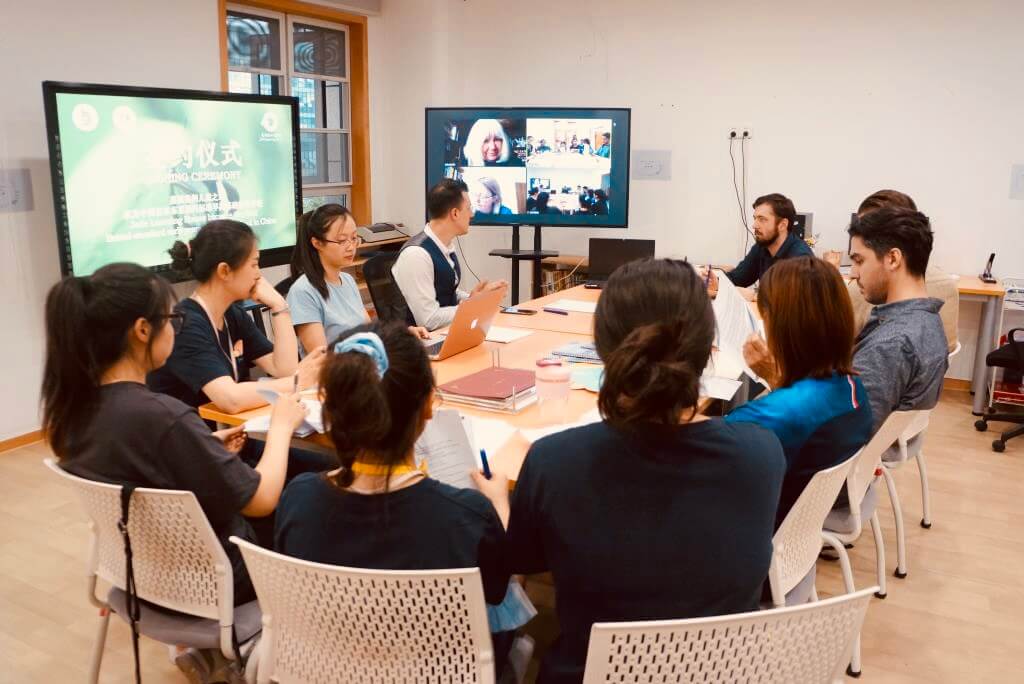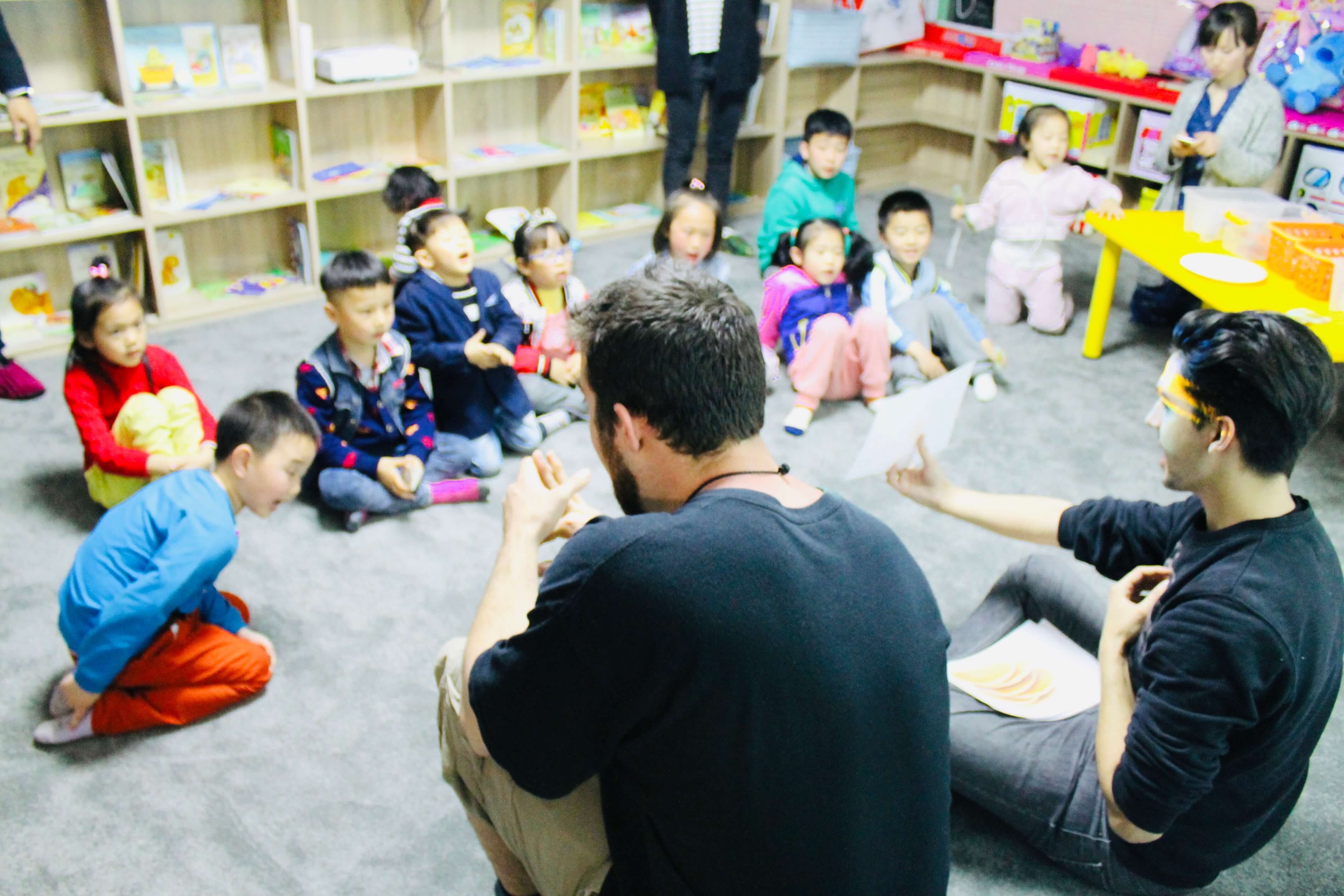After coming to China 7 years ago to teach English at a Kindergarten, I can honestly say that it was and still is an amazing experience, and one which I hope to continue for many more years. Being a teacher requires patience, a love of imparting knowledge, and a great deal of creativity; you are there to give students the chance to explore and maintain interest in new topics. It can be very testing work, but is also extremely rewarding. As a home room teacher, I’m responsible for accompanying classes of early-years children until they leave for primary school. This is a very big responsibility; as an educator, my role is to help my students develop not only their level of English, but also their innate curiosity and interest in the different topics that are covered.
International Kindergartens versus Regular Kindergartens
The biggest difference is in the curriculum established by each school, as well as the cost of tuition. As a general rule, international kindergartens follow an international curriculum and hire teachers with a lot of experience, and are quite expensive. There are fewer students in each class, which generally provides better support for each student.
Chinese preschools (regular kindergartens) follow a Chinese curriculum which incorporates English lessons. Most parents opt for this, because the cost is more affordable. However, the number of students per class can be quite high (around 20 to 30) which generally results in less support per student, and makes it more difficult for teachers to maintain order in the class.
My regular week teaching at a Kindergarten
I am currently a home room teacher working for an international kindergarten. Before getting this job, I worked in other kindergartens as an ESL teacher. In the ESL teacher role, my job was mainly to teach basic knowledge of English through interesting activities, which primarily were focused on getting students to repeat the vocabulary to be learned.
Now as a home room teacher, my job is focused on creating projects with my students relating to a specific theme (for example, the study of the solar system). A project can be carried out over 4 to 5 weeks, during which time the students explore the chosen theme through various new activities. Educational trips to museums or other places are also carried out, in order to give students the maximum amount of exposure to chances to learn English in new settings. The most interesting point when exploring these themes is when the students show an interest in something related to the main subject. It allows me to create activities related to their interest, such that they can take an active role in their learning, using their own comprehension and critical analysis skills to ask new and varied questions. Sometimes I have to conduct my own research to answer my students' questions, which leads to me learning new things.
Another part of my job is teaching reading and writing, reading appropriate books with interesting stories, and also teaching phonics.
What Does a Teacher in a Kindergarten in China Usually Do?
You must be aware that your expectations will be a little bit different from reality. Teaching English in a kindergarten in China is not just about teaching, and it is more challenging than you may expect.
You will have to participate in various internal meetings, often held in Chinese. You don’t need to know Chinese or contribute to the meeting, but your attendance is still expected, along with all other staff. This is common in Chinese work culture.
Meetings with parents also take place, where you will be expected to discuss the progress of their son or daughter with them.
Beyond that, you will have to create your own lesson plans, which can be tedious at times but are necessary for laying out what needs to be done during class. Lesson plans help you keep track of what has been covered and what needs to be carried over to the next class.
You may also be asked to write reports, plan activities, dress up, or organize and partake in certain events.
As a home room teacher, you need to stay in touch with parents more regularly, often on a daily basis. Building and maintaining a relationship with parents is therefore essential. The relationship remains professional but can be close. This part is very important because parents will contact you to ask sometimes very unusual questions (from a Western perspective), pertaining to the progress of their child’s learning. Other ESL teachers do not need to be in such regular contact with the parents of their students.

What I Love Most About Teaching Kindergarten in China
What I love most is making a positive impact on the lives of my students. I welcome them into my classroom when they are very young and can hardly speak, then accompany them until they are ready for elementary school. During this time, I build a very close relationship with them; in a way I become like their big brother. They can confide in me anytime about what they like or dislike, and share all kinds of stories with me. Observing their personal and intellectual growth brings great satisfaction.
Exploring different themes and working on the various projects with my students is also something that I love about this job. It gives me the opportunity to observe and appreciate the different types of intelligence that are fostered during development.
Traits to be a Kindergarten Teacher
Here are some triats that are important to be a kindergarten teacher:
Passion and enthusiasm: You really need to be passionate about teaching, and need to be enthusiastic about introducing new things to your students. A passionate and enthusiastic teacher will have students who are very receptive and therefore very keen to learn more. Children are very sensitive to the behaviour of adults.
Patience: Patience is absolutely necessary because you operate in an environment where children will constantly be distracted and may disrupt the course of your lessons. Above all, children are very curious and constantly want to ask questions, regardless of whether you are busy or engaged with another student. Even when things get difficult, it is important to take the time to explain things and answer questions without showing that you are annoyed.
Empathy: You have to understand how a child thinks. A rowdy kid doesn't necessarily have a lack of education. It may be the only way for him to communicate something and express his feelings. Each student learns at their own pace. Some learn faster than others, so it is imperative to accommodate the needs of all, and adapt as necessary.
Creativity: Creativity is at the center of this work. You will have to teach different topics and therefore need to find many things to do with your students. Beyond being patient, passionate and enthusiastic, you must have a creative mind, able to develop interesting content that will lead your students to learn while having fun. You have to vary your activities, with songs, games, etc.
Role model: Because you are their teacher, you occupy a very important place in students’ lives. Your role is to guide them in the early stages of their life and teach them core values, to educate them to be responsible and to prepare them for the life that awaits them after kindergarten.

Requirements to Teach Kindergarten in China
To teach kindergarten in China, you need:
- Bachelor's degree in any field
- Age between 22 and 60 (as per China's work visa policy)
- Clear criminal background check
- TEFL Certificate (minimum 120 hours); educational or early childhood education degree preferred
- Previous teaching experience in a kindergarten is preferred
Although prior experience in kindergarten teaching is desirable, it is not obligatory. Kindergartens frequently value teachers who exhibit enthusiasm and genuine concern for children, placing these qualities above other considerations. This is especially the case in standard kindergartens.
Salaries to teach English at Kindergarten in China
The salary that can be earned as a kindergarten teacher in China can vary depending on various factors such as the location, type of kindergarten, qualifications, experience, and the specific policies of the kindergarten. Generally, kindergarten teachers in China can expect a range of salaries.
In larger cities and more developed regions, such as Beijing, Shanghai, and Guangzhou, the salaries tend to be higher compared to smaller cities or rural areas (however, cost of living is also much higher). On average, the monthly salary for a kindergarten teacher in China can range from approximately 14,000 to 28,000 Chinese Yuan (CNY).
Apart from your monthly salary, many kindergartens in China offer additional benefits as part of the compensation package. These benefits may include housing allowances or provided accommodations, flight allowances or reimbursement for travel expenses, health insurance, paid holidays, and visa sponsorship.
Teachers with higher qualifications, such as a bachelor's or master's degree in early childhood education or related fields, along with relevant teaching experience, may be able to negotiate higher salaries. Additionally, teachers who possess specialized skills, such as fluency in English or experience in international curricula, may also receive higher compensation.
Teaching kindergarten in China is a rewarding experience that requires dedication, patience, and creativity. Whether in an international or regular kindergarten, the role goes beyond English teaching. My main joy came from making a positive impact on my students' lives and witnessing their growth. Kindergarten teachers become trusted members of students' lives, guiding them and preparing them for the future. It's a fulfilling journey of fostering curiosity and learning while building strong relationships with students and their families.
As a teacher, you will go beyond your role and become a cherished member of their family, earning their immense trust.









